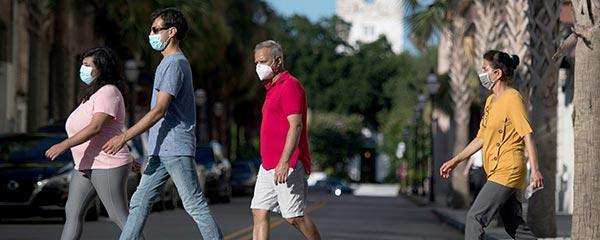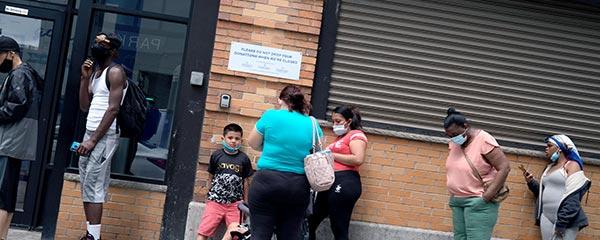Story Highlights
- 65% are completely satisfied with their physical safety at work
- Down from 74% a year ago, and the lowest since 2001
- Workers more satisfied with co-worker relations than other job aspects
WASHINGTON, D.C. -- Sixty-five percent of U.S. workers say they are completely satisfied with the physical safety conditions at their workplace, down significantly from 74% a year ago. The decline comes amid the coronavirus pandemic, which has made workplace environments risky due to contact with co-workers or the public. Satisfaction with workplace safety was last at this level in 2001. It had been as high as 79% just three years ago.

Line graph. Sixty five percent of US workers are completely satisfied with the physical safety conditions at their workplace down from 74% last year.
The results are from ║┌┴¤═°'s annual Work and Education poll, conducted July 30-Aug. 12.
Lower-income workers, those without a college degree, and men are among the groups who have had the largest declines in satisfaction with workplace safety. These groups are more likely than others to hold jobs that can be considered blue collar, including service, repair and factory jobs.
| 2019 | 2020 | Change | |||||||||||||||||||||||||||||||||||||||||||||||||||||||||||||||||||||||||||||||||||||||||||||||||
|---|---|---|---|---|---|---|---|---|---|---|---|---|---|---|---|---|---|---|---|---|---|---|---|---|---|---|---|---|---|---|---|---|---|---|---|---|---|---|---|---|---|---|---|---|---|---|---|---|---|---|---|---|---|---|---|---|---|---|---|---|---|---|---|---|---|---|---|---|---|---|---|---|---|---|---|---|---|---|---|---|---|---|---|---|---|---|---|---|---|---|---|---|---|---|---|---|---|---|---|
| % | % | Pct. Pts. | |||||||||||||||||||||||||||||||||||||||||||||||||||||||||||||||||||||||||||||||||||||||||||||||||
| All Workers | 74 | 65 | -9 | ||||||||||||||||||||||||||||||||||||||||||||||||||||||||||||||||||||||||||||||||||||||||||||||||
| Men | 79 | 65 | -14 | ||||||||||||||||||||||||||||||||||||||||||||||||||||||||||||||||||||||||||||||||||||||||||||||||
| Women | 68 | 65 | -3 | ||||||||||||||||||||||||||||||||||||||||||||||||||||||||||||||||||||||||||||||||||||||||||||||||
| White workers | 78 | 69 | -9 | ||||||||||||||||||||||||||||||||||||||||||||||||||||||||||||||||||||||||||||||||||||||||||||||||
| Non-White workers | 67 | 59 | -8 | ||||||||||||||||||||||||||||||||||||||||||||||||||||||||||||||||||||||||||||||||||||||||||||||||
| College graduate | 71 | 71 | 0 | ||||||||||||||||||||||||||||||||||||||||||||||||||||||||||||||||||||||||||||||||||||||||||||||||
| College nongraduate | 77 | 61 | -16 | ||||||||||||||||||||||||||||||||||||||||||||||||||||||||||||||||||||||||||||||||||||||||||||||||
| Annual household income less than $75,000 | 72 | 55 | -17 | ||||||||||||||||||||||||||||||||||||||||||||||||||||||||||||||||||||||||||||||||||||||||||||||||
| Annual household income $75,000 or higher | 78 | 73 | -5 | ||||||||||||||||||||||||||||||||||||||||||||||||||||||||||||||||||||||||||||||||||||||||||||||||
| ║┌┴¤═° | |||||||||||||||||||||||||||||||||||||||||||||||||||||||||||||||||||||||||||||||||||||||||||||||||||
Many white-collar workers have shifted to fulltime remote work during the pandemic. As might be expected, workers who are now working primarily or entirely from home are generally satisfied with their physical safety conditions - 74% say they are. In contrast, 61% of those who indicate they are working mostly or completely outside their home are satisfied.
Worker Satisfaction With Other Job Aspects Generally Steady
In addition to workplace safety, ║┌┴¤═° measures worker satisfaction with 12 other job aspects. Satisfaction did not change to a meaningful degree on any of the aspects besides workplace safety.
Prior to this year, workplace safety was typically one of the job aspects with which workers were most satisfied. Now, it has fallen behind co-worker relations (75%) and the flexibility of work hours (68%). Satisfaction with job security (64%) and one's boss or immediate supervisor (63%) are similar to satisfaction with workplace safety.
Workers are least satisfied with the amount of stress associated with their job (35%) and the amount of money they earn (39%).
| Completely satisfied, 2019 | Completely satisfied, 2020 | Change | |||||||||||||||||||||||||||||||||||||||||||||||||||||||||||||||||||||||||||||||||||||||||||||||||
|---|---|---|---|---|---|---|---|---|---|---|---|---|---|---|---|---|---|---|---|---|---|---|---|---|---|---|---|---|---|---|---|---|---|---|---|---|---|---|---|---|---|---|---|---|---|---|---|---|---|---|---|---|---|---|---|---|---|---|---|---|---|---|---|---|---|---|---|---|---|---|---|---|---|---|---|---|---|---|---|---|---|---|---|---|---|---|---|---|---|---|---|---|---|---|---|---|---|---|---|
| % | % | Pct. Pts. | |||||||||||||||||||||||||||||||||||||||||||||||||||||||||||||||||||||||||||||||||||||||||||||||||
| Your relations with co-workers | 74 | 75 | 1 | ||||||||||||||||||||||||||||||||||||||||||||||||||||||||||||||||||||||||||||||||||||||||||||||||
| The flexibility of your hours | 64 | 68 | 4 | ||||||||||||||||||||||||||||||||||||||||||||||||||||||||||||||||||||||||||||||||||||||||||||||||
| The physical safety conditions of your workplace | 74 | 65 | -9 | ||||||||||||||||||||||||||||||||||||||||||||||||||||||||||||||||||||||||||||||||||||||||||||||||
| Your job security | 65 | 64 | -1 | ||||||||||||||||||||||||||||||||||||||||||||||||||||||||||||||||||||||||||||||||||||||||||||||||
| Your boss or immediate supervisor | 59 | 63 | 4 | ||||||||||||||||||||||||||||||||||||||||||||||||||||||||||||||||||||||||||||||||||||||||||||||||
| The amount of work that is required of you | 58 | 60 | 2 | ||||||||||||||||||||||||||||||||||||||||||||||||||||||||||||||||||||||||||||||||||||||||||||||||
| The recognition you receive at work for your work accomplishments | 52 | 57 | 5 | ||||||||||||||||||||||||||||||||||||||||||||||||||||||||||||||||||||||||||||||||||||||||||||||||
| The amount of vacation time you receive | 56 | 54 | -2 | ||||||||||||||||||||||||||||||||||||||||||||||||||||||||||||||||||||||||||||||||||||||||||||||||
| Your chances for promotion | 44 | 48 | 4 | ||||||||||||||||||||||||||||||||||||||||||||||||||||||||||||||||||||||||||||||||||||||||||||||||
| The health insurance benefits your employer offers | 41 | 43 | 2 | ||||||||||||||||||||||||||||||||||||||||||||||||||||||||||||||||||||||||||||||||||||||||||||||||
| The retirement plan your employer offers | 36 | 41 | 5 | ||||||||||||||||||||||||||||||||||||||||||||||||||||||||||||||||||||||||||||||||||||||||||||||||
| The amount of money you earn | 37 | 39 | 2 | ||||||||||||||||||||||||||||||||||||||||||||||||||||||||||||||||||||||||||||||||||||||||||||||||
| The amount of on-the-job stress in your job | 34 | 35 | 1 | ||||||||||||||||||||||||||||||||||||||||||||||||||||||||||||||||||||||||||||||||||||||||||||||||
| ║┌┴¤═° | |||||||||||||||||||||||||||||||||||||||||||||||||||||||||||||||||||||||||||||||||||||||||||||||||||
In addition to workplace safety conditions, remote and onsite workers differ on job security, only in this case, it is onsite workers who are more satisfied (69%) than remote workers (53%), perhaps reflecting increased workloads of frontline workers. The two types of workers show similar levels of satisfaction on all other work aspects measured in the survey.
Implications
The coronavirus has temporarily, if not permanently, transformed the way most Americans work. In general, the changes have not significantly altered the way employed Americans view their jobs, with the exception of a decline in satisfaction with their physical safety at work. This decline was perhaps unavoidable given how contagious the coronavirus is, and is the case even though many employers are taking precautions to keep their employers safe. But such precautions, which are becoming increasingly common, may have helped prevent an even steeper decline in worker satisfaction with their safety. Of course, many workers are avoiding COVID-19 exposure by working remotely; ║┌┴¤═° estimates one in four workers are now fulltime remote workers.
View complete question responses and trends (PDF download).
Learn more about how the works.




